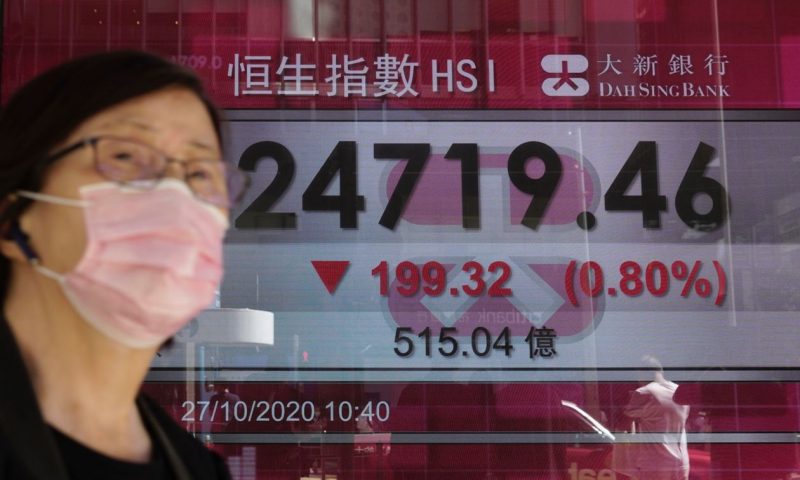Stock benchmarks fall in Tokyo, Shanghai, Hong Kong and Sydney
Shares skidded in Asia on Tuesday after surging coronavirus cases and waning hopes for U.S. economic stimulus gave Wall Street its worst day in a month.
Stock benchmarks fell in Tokyo, Shanghai, Hong Kong and Sydney. Shares also dipped in South Korea, despite economic growth data were slightly better than expected.
Overnight, the S&P 500 fell 1.9%, deepening its losses from last week. Stocks of companies worst hit by the pandemic logged some of the biggest losses. Cruise lines, airlines and energy stocks tumbled in tandem with crude oil prices.
In another sign of caution, Treasury yields pulled back after touching their highest level since June last week and were steady at 0.80% on Tuesday.
The gloom carried into trading in Asia, where Japan’s Nikkei 225 NIK, -0.35% lost 0.4% and the Hang Seng HSI, -0.63% in Hong Kong slumped 1.2%. South Korea’s Kospi 180721, -0.27% fell 0.2%, while Australia’s S&P/ASX 200 XJO, 0.07% sank 1.8%. The Shanghai Composite index SHCOMP, -0.42% gave up 0.4%. Benchmark indexes in Taiwan Y9999, -0.37%, Singapore STI, -0.35% fell while stocks were about flat in Indonesia JAKIDX, -0.30%.
South Korea’s relatively strong showing reflected a better than expected 1.9% economic growth in the last quarter, following a 3.2% quarterly decline in April-June. Strong exports led the rebound, economists said.
Hope that Washington would come through with more stimulus for the economy before the Nov. 3 election soured after the Senate adjourned Monday night until after the election. Earlier, House Speaker Nancy Pelosi and Treasury Secretary Steven Mnuchin failed to reach an agreement in a phone call Monday, according to a Pelosi aide. The two have been discussing a potential deal to send cash to most Americans, restart supplemental benefits for laid-off workers and provide aid to schools, among other things.
Coronavirus counts are surging in much of the United States and Europe, raising concerns about more damage to still-weakened economies. In Europe, Spain’s government has declared a national state of emergency that includes an overnight curfew, while Italy ordered restaurants and bars to close each day by 6 p.m. and shut down gyms, pools and movie theaters.
“While we are seeing nations attempt to stifle the spread of the virus through more localized and tentative restrictions, it seems highly likely that we will eventually see a swathe of nationwide lockdowns if the trajectory cannot be reversed,” said Joshua Mahony, senior market analyst at IG in London.
The S&P 500 SPX, -0.30% slid 1.9% to 3,400.97. The Dow DJIA, -0.80% slumped 2.3%, to 27,685.38. The Nasdaq composite COMP, +0.63% lost 1.6% to 11,358.94.
The U.S. economy has recovered a bit since stay-at-home restrictions that swept the country earlier this year eased. Economists expect a report on Thursday to show it grew at an annual rate of 30.2% during the summer quarter after shrinking 31.4% during the second quarter.
But momentum has slowed after a round of supplemental unemployment benefits and other stimulus that Congress approved earlier this year expired.
Energy stocks dropped to the largest loss among the 11 sectors that make up the S&P 500, falling in concert with oil prices. All told, about 92% of the stocks in the S&P 500 closed lower.
On Tuesday, oil prices steadied, with U.S. benchmark crude CLZ20, -2.22% gaining 19 cents to $38.75 per barrel in electronic trading on the New York Mercantile Exchange. It skidded $1.29 to $38.56 on Monday. Brent crude BRNZ20, -1.77%, the international standard, picked up 20 cents to $41.01 per barrel.
In currency trading, the dollar USDJPY, -0.12% bought 104.72 Japanese yen, down from 104.86 late Monday.

